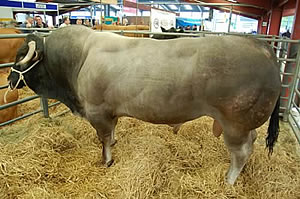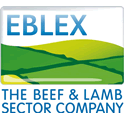| 13/09/06
Conducting a routine breeding soundness assessment on all stock
bulls both before purchase and 30 to 60 days before the start of
each breeding season is a good way for English dairy and suckler
herds to guard against bull fertility problems, advises the English
Beef and Lamb Executive (EBLEX) in its latest Beef Action for Profit
fact sheet.
'the economic worth of a bull
depends upon his ability to work'
 |
‘Better Returns from Better Stock Bull Buying’ emphasises
the critical importance of physical soundness and fertility as
well as high breeding value in stock bulls to boost returns and
cut costs, pointing out that it is estimated that between 20 to
40 per cent of all bulls have unacceptable fertility levels – being
either infertile or sub-fertile.
Stressing the extent to which the economic worth of a bull depends
upon his ability to work, EBLEX sets out a four-point breeding
soundness checklist involving separate assessments of general health
and condition, legs and feet, reproductive organs and semen quality
to guide herd management.
Soundness Assessment for Bulls
1. General health & condition |
Ensure the eyes are clear and
free from injury, and teeth are neither excessively worn
nor lost.
Avoid overworking excessively thin or fat bulls. |
2. Legs and feet |
Avoid hind limbs that are too
straight or cow-hocked, or hooves with prominent ridges on
the horn of the claws.
Look for easy movement, with the rear hooves landing in the
imprint of the front ones.
Trim hooves whenever necessary. |
3. Reproductive organs |
Look for a scrotum that is symmetrical
and sufficiently large.
Ensure the testes are firm and move freely within the scrotal
sac, with the upper portion of the epididymis soft and free
of lumps.
Be aware the erect penis should be parallel to the bull’s
body. |
4. Semen quality |
Assess sperm for both viability
and morphology with a veterinary laboratory test, being aware
that semen quality is affected by management and can change
rapidly. |
As well as inspecting bulls thoroughly for soundness, a careful
check of their health status is strongly advised before purchase,
with all new bulls isolated and checked over by the vet before
joining the herd as part of a strict biosecurity programme.
It is recommended that yearling bulls should be purchased well
before they are needed, acclimatised to herd life gradually and
prepared for work from 18 months of age. Care should be taken to
avoid over-working young bulls in particular. And all bulls should
be managed to be in Body Condition Score 3 at the start of the
breeding season and maintained in good condition (BCS 2.5 -3) throughout
it.
Copies of Beef Action for Profit Fact Sheet 9 are available free
of charge to English levy payers from EBLEX on 0870 2418829 or
by e.mailing info@eblex.org.uk. More detailed information and guidance
linked to the factsheet can be obtained through the unique interactive
website resource at www.eblex.org.uk.
 Skipton Venue For Beef Expo 2007 Skipton Venue For Beef Expo 2007
 Relaxed monitoring of beef imports from Brazil causes concern Relaxed monitoring of beef imports from Brazil causes concern
 Beef Snapshot Puts Farms On Target Beef Snapshot Puts Farms On Target |



